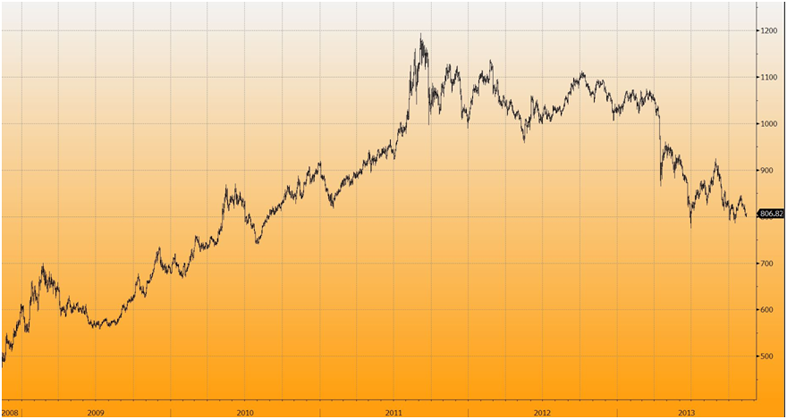Today’s AM fix was USD 1,281.00, EUR 956.90 and GBP 807.03 per ounce.
Yesterday’s AM fix was USD 1,283.75, EUR 957.81 and GBP 801.54 per ounce.
Gold fell $3.90 or 0.3% yesterday, closing at $1,283.50/oz. Silver slipped $0.09 or 0.42% closing at $21.36. Platinum inched down $9.51 or 0.7% to $1,428.99/oz, while palladium fell $4.47 or 0.6% to $751.50/oz.
Gold dipped again in London on fears that a stronger U.S. economy will entice the U.S. Fed to taper its stimulus program and on positive economic data from China. Silver bullion slid to its lowest in four weeks, while gold is hovering at three week lows. In South Africa, the National Union of Mineworkers at Northam Platinum Ltd. continue their strike that started on November 4th.

Gold in British Pounds, 10 Year – (Bloomberg)
SIPPs or Self-Invested Personal Pensions were launched by the UK government in 2006 in order to enable UK citizens to gain more control over their pension investment portfolio. The UK government also launched the Small Self-Administered Scheme known as a SSAS, an occupational pension scheme which is designed for up to 12 members.
From the perspective of the gold bullion industry this was welcome news, as the newly launched SIPP and SSAS permitted individuals or groups to invest in a range of approved types of gold bullion as part of their pension provision. To protect SIPPs and SSASs from inferior product, all gold must come in the form of ‘good delivery bars’ as per the London Bullion Market Association who maintains a list of approved bar manufactures such as the Perth Mint of Western Australia.
Gold bullion and pensions are a powerful combination. Pensions are extremely tax efficient investment structures that have been ignored by the general public for too long despite being very easy to set up. Gold is a form of financial insurance and essential diversification that empowers investors to hedge and therefore reduce the long term risks involved in all investment strategies.
Contributions into SIPPs and SSASs qualify for income tax relief up to the highest rate. Important to note that once invested in your SIPP or SSAS, all investments grow capital gains tax free and there is no further liability to income tax.
In times gone by it was common to stay in the one job with the same company for one’s entire working career. Today’s working environment is dramatically different and it is not uncommon for professionals to have more than one pension scheme which reflects their career to date; having worked in a variety of different positions with different companies, all who have different pension schemes.
The SIPP affords you the opportunity to consolidate your pension schemes into one scheme. As we have long advocated here at GoldCore, when taking advice on your financial affairs, particularly your pension, seek the advice of a fee based financial advisor.
Click here for our guide to Putting Gold In Your Pension Plan in the UK.
Click Gold News For This Week’s Breaking Gold And Silver News
Click Gold and Silver Commentary For This Week’s Leading Gold And Silver Comment And Opinion
Like Our Facebook Page For Breaking News, Interesting Insights, Blogs, Prizes and Special Offers







via Zero Hedge http://feedproxy.google.com/~r/zerohedge/feed/~3/5Epi9ZV6pr0/story01.htm GoldCore
![]()















